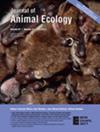Inbreeding accelerates reproductive senescence, but not survival senescence, in a precocial bird
IF 3.5
1区 环境科学与生态学
Q1 ECOLOGY
引用次数: 0
Abstract

近亲繁殖会加速前社会鸟类的生殖衰老,但不会加速生存衰老。
据预测,近亲繁殖抑制会随着年龄的增长而增加,因为自然选择在清除晚期才表现出来的有害等位基因方面效率较低。然而,实证结果很少,而且不同研究之间的结果也不一致。在这里,我们对有亲缘关系和无亲缘关系的驯化日本鹌鹑(Coturnix japonica)个体进行了控制性交配,并监测了其后代在整个生命过程中所有适应性成分的表现。我们发现,成年鹌鹑的存活率和产卵性能迅速衰退,并且在各个生命阶段都存在近亲繁殖抑制(胚胎存活率降低、成熟年龄增加、成年鹌鹑存活率和繁殖率降低)。近亲繁殖抑制在晚龄存活率方面没有增加,但在产卵方面却增加了,从而加速了生殖衰老。此外,近亲繁殖对产卵的影响在校正了寿命后仍然存在,这表明近亲繁殖对存活和繁殖都有独立的影响。我们认为,在异质种群中,代内净化可能在较早的年龄就已经选择出了导致存活率降低的特定等位基因的同源个体,从而防止出现随着年龄增长存活率降低的近交抑郁现象。鉴于近亲繁殖对繁殖的影响与存活率无关,这一点不应适用于生殖衰老或同质种群,这可能是不同性状和不同研究结果不一致的原因。
本文章由计算机程序翻译,如有差异,请以英文原文为准。
求助全文
约1分钟内获得全文
求助全文
来源期刊

Journal of Animal Ecology
环境科学-动物学
CiteScore
9.10
自引率
4.20%
发文量
188
审稿时长
3 months
期刊介绍:
Journal of Animal Ecology publishes the best original research on all aspects of animal ecology, ranging from the molecular to the ecosystem level. These may be field, laboratory and theoretical studies utilising terrestrial, freshwater or marine systems.
 求助内容:
求助内容: 应助结果提醒方式:
应助结果提醒方式:


